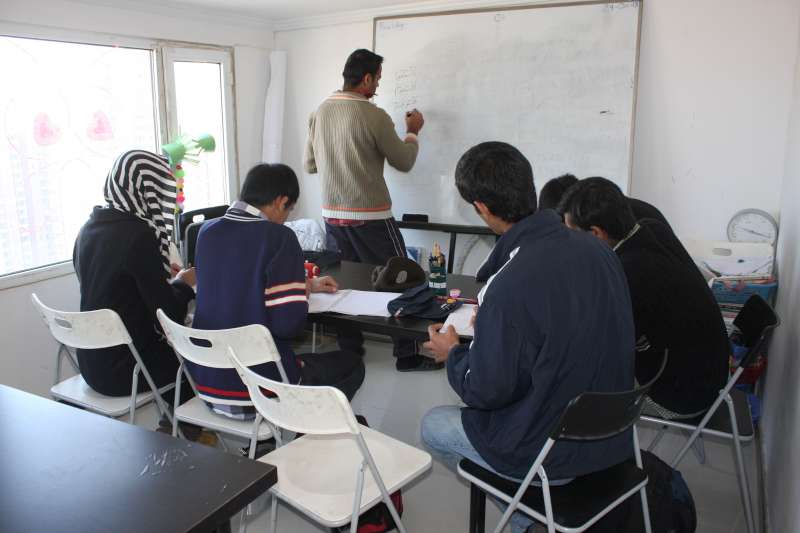Chinese schools offer primary education for urban refugees.中国学校为城市中的难民提供小学教育。

Sammy (second from left) attending an informal Urdu-English class run by Pakistani Ahmadi refugee volunteers in Sanhe city. © UNHCR/V.Tan
萨米(左二)参加一个巴基斯坦艾哈迈迪教派难民志愿组织在三河市设立的非正式的乌尔都语-英语课。联合国难民署/ v.tan©
Chinese schools offer primary education for urban refugees
In an important breakthrough, five provinces in China have offered refugee children the chance to attend primary school.
中国学校为城市中的难民提供小学教育。
一个重要的突破,中国五个省份为难民儿童提供了参加小学教育的机会。
By Vivian Tan, ed. Leo R. Dobbs | 22 November 2013
SANHE, China, November 22 (UNHCR) - It’s an unusual institute of “higher” learning, perched 26 floors above the city of Sanhe in Hebei province, China. As the teacher writes on the white board, his six students scribble intently in their notebooks. Aged from eight years to their late teens, they are unlikely classmates in this sunny attic far from home.
三河市,中国,11月22日(难民署)- 这是一个不寻常的“高层”学习机构,在中国河北省三河市的26层楼上。老师在白板上书写,他的六个学生匆匆地在他们的笔记本上涂鸦。从八岁到十几岁,他们难得地成为这个远离家乡的阳光阁楼的同学。
The students are refugees from the Ahmadi community, a religious minority in Pakistan. Four mornings a week they attend informal lessons in the rented apartment of one of the refugee families. Two adult refugees volunteer as teachers on subjects ranging from Urdu to English and Mathematics. On weekends, they get a break when Chinese and Korean students visit and offer Chinese language lessons.
学生是艾哈迈迪教派难民,巴基斯坦的宗教少数民族。他们每周在四个上午参加一个难民家庭租来的公寓的非正式课程。两个成年难民自愿成为乌尔都语教学的英语和数学老师。周末,当中国学生和韩国学生去参观并上汉语课时,他们会得到休息。
The desire to learn is strong, but until recently, these informal lessons were the only education the refugees could get.
学习的欲望是强烈的,但直到最近,这些非正式的课程是难民能得到的唯一教育。
In a welcome development last November, the Chinese government announced that refugee children in five provinces could attend public schools at the primary level under the same conditions as local children. Since then, UNHCR has been negotiating with schools at the local level to accept refugee students.
一个可喜的进展在去年十一月,中国政府宣布,在五个省的难民儿童可以在与当地儿童相同的条件下就读公立小学。自那时以来,难民专员办事处一直在与地方一级的学校谈判,接受难民学生。
Sammy, 13, is one of the lucky ones. But it wasn’t always the case. Born in the Pakistani city of Lahore, he faced discrimination for his religious beliefs. “My teacher created problems without any reason. He punished me and deducted marks,” he recalled. “Kids wouldn’t play with us, they would hurt us.”
萨米,13,是一个幸运的人。但情况并非总是如此。他出生在巴基斯坦的拉合尔,面临宗教信仰歧视。我的老师毫无理由地制造矛盾。他惩罚我并扣分,”他回忆道。“孩子们不会和我们一起玩,他们会伤害我们的。”
In 2010, in the wake of an attack on Lahore’s Ahmadi mosques and threats against the community, Sammy fled to China with his mother and three siblings. They filed an asylum claim with UNHCR’s office in Beijing and were recognized as refugees.
2010年在拉合尔的艾哈迈迪清真寺兴起的威胁攻击之后,萨米与他的母亲和三个兄弟姐妹逃到中国。他们向难民署驻北京办事处提出避难申请,并被确认为难民。
Today the family lives in Sanhe city close to three other Ahmadi refugee families.
今天生活在三河市附近的三个其他艾哈迈迪教派难民家庭。
The community is close-knit and well organized, running classes in the mornings and playing sport in the afternoons to pass time until long-term solutions can be found for their plight.
社区组织严密,组织良好,每天早上上课,下午进行体育活动消磨时间,直到找到长期的解决办法。
They are proud of Sammy’s admission to Chinese school, and encourage him to persist through teething problems.
萨米承认在中国学校感到自豪,并鼓励他坚持通过磨合问题。
At 13, Sammy is one of the oldest students in his Grade Three class, where the average age is eight. His favourite class is English, but he finds the level too simple. The rest of the classes are taught in Chinese, which he speaks and understands to a limited degree, but cannot read or write. “My classmates are nice but we don’t talk much. I sit by myself for eight hours every day. It’s very lonely,” he said.
13岁的萨米是一个在他三年级班上最老的学生,那里的平均年龄是八岁。他最喜欢的课是英语,但他觉得水平太简单了。其余的课是用中文授课的,他说的懂的程度有限,但不会读写。“我的同学很好,但我们不怎么说话。我每天独自坐八个小时。“很孤独,”他说。
“This is the first time the school has accepted a foreign student,” noted Li Beibei, UNHCR’s community services assistant. “I know it’s hard to communicate now, but try to practise and you will improve. Chinese is difficult but if you start young, you will remember many things. It will be useful for your future life.”
难民署社区服务助理李贝蓓指出:“这是学校第一次接受外国学生。”。“我知道现在很难沟通,但是试着去练习,你会进步的。”。汉语很难学,但如果你从小开始,就会记住很多东西。这对你以后的生活很有帮助。”
His teacher Zafar* adds that if he wants to achieve his dream to be a scientist, he will need formal education and school certificates.
他的老师*补充说,如果他想实现他的梦想成为一个科学家,他将需要接受正规教育和学校文凭。
There is a lot riding on Sammy’s slim shoulders as the community looks to him to set a good example for the younger boys. Zafar’s family recently moved here from Beijing and he is hoping his own two sons will be able to join Sammy in school soon. If they are eventually admitted, they will join the handful of refugee students who are currently enrolled in primary schools in China.
萨米纤细的肩膀为社区年轻的男孩们树立一个好榜样。Zafar的家人最近从北京搬到这里,他希望自己的儿子能加入萨米在学校很快。如果他们最终被承认,他们将加入目前就读于中国小学的少数难民学生。
There are some 500 urban refugees and asylum-seekers in mainland China as well as 350,000 Vietnamese refugees who arrived in the late 1970s and are now successfully integrated into Chinese society.
在中国大陆有500个外国难民和寻求庇护者。20世纪70年代末曾经有350000名越南华人难民抵达,现在他们(华人难民)已经成功地融入中国社会。
*Names changed for protection reasons.
为保护当事人采用化名
Hi! I am a robot. I just upvoted you! I found similar content that readers might be interested in:
http://www.unhcr.org/news/latest/2013/11/528f66086/chinese-schools-offer-primary-education-urban-refugees.html